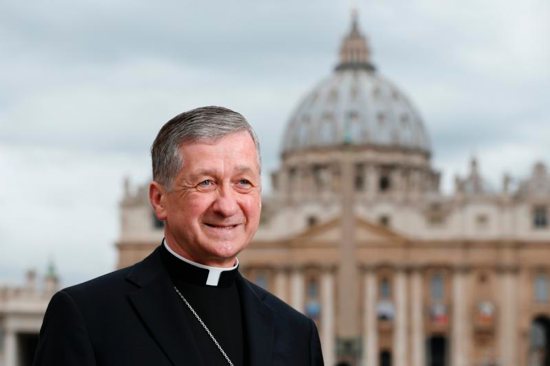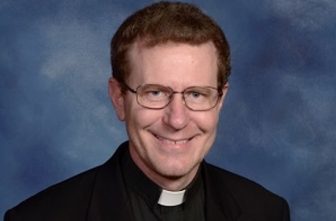
For Cardinal-designate Blase Cupich of Chicago, one of nine children born to a family in Omaha, Nebraska, more than 40 years of priesthood have been filled with “Are you kidding me?” moments.
Like Pope Francis, the archbishop of Chicago has a special affection for Caravaggio’s painting of “The Calling of St. Matthew” and he often stops in Rome’s Church of St. Louis of France to look at it.
Ordained a bishop on the feast of St. Matthew, Sept. 21, in 1998, Cardinal-designate Cupich said that the call of Matthew speaks to “my own spirituality.” In the painting, he said, Matthew has “that surprised look on his face, that sense of wonderment, of ‘Are you kidding me?’ And that’s the way I kind of feel at this point in my life.”
“No one could have ever crafted this story; this is something that is an ‘Are you kidding me?’ moment,” the cardinal-designate told Catholic News Service Oct. 13 during an interview in Rome.
Just a few days after Pope Francis announced Oct. 9 that he would induct the Chicago archbishop and 16 other churchmen into the College of Cardinals, Cardinal-designate Cupich was at the Vatican on a previously scheduled trip to take part in a meeting of the Congregation for Bishops.
He still had not received any written communication about his nomination, which he learned about when a friend from Rome phoned at 5 a.m. Chicago time and woke him up. “I was hoping to sleep in until 7 o’clock that nice Sunday,” he said. His friend said, “You’re on the list,” and Archbishop Cupich responded, “What list?”
“It did come as a real surprise. I didn’t know there was going to be an announcement,” he said. The pope’s nuncio to the United States, Archbishop Christophe Pierre, called the next day to congratulate him.
The previous six archbishops of Chicago received a red hat, but Pope Francis has been skipping over several archdioceses traditionally led by cardinals. “This pope is a pope of surprises. So I think it wasn’t something I had my heart set on.”
Pope Francis, in making the announcement, tied the nominations to the Year of Mercy; the new cardinals will concelebrate Mass with him Nov. 20 to formally close the Holy Year.
More than being about specific projects or works of mercy, Cardinal-designate Cupich said the year has “forced me to reflect on the fact that the Gospel has as its main message mercy. … It’s made me look at mercy not just as an add-on, but as the center of proclaiming the Gospel.”
“Mercy means realizing that before we did anything, we’re loved. That we’re valued. That God wants us to succeed — even to the point that when we go wrong, when we err, when we make mistakes, when we are sinful,” he said, God tells us, “‘Move forward. I want you to succeed. I’m there to help you.'”
Rather than being like a tribunal that commutes a sentence and allows the person to go back to where they were, he said, “mercy is an experience that moves us forward,” it involves being “surprised and caught off guard” by God’s love and responding by making a commitment to do better.
Cardinal-designate Cupich said he does not know many of the other cardinals-designate, but “one of the most striking appointments” was that of Archbishop Mario Zenari, the nuncio to Syria, who will remain in Syria. The nomination, he said, is a recognition of the nuncio’s ministry in the midst of war, “but also, knowing a number of people who are in the diplomatic corps of the Holy See, I would imagine this is a shot in the arm for them; it is a way the Holy Father can lift up the work that they are doing day in and day out in so many unrecognized ways.”
Another surprise in the announcement was that Pope Francis named three prelates who had been ministering in the United States: Cardinals-designate Cupich, Joseph W. Tobin of Indianapolis, and Kevin J. Farrell, who had been bishop of Dallas and is the new prefect of the Dicastery for Laity, Family and Life.
Choosing three shows Pope Francis “values the experience of the church in our country,” the Chicago archbishop said. “Especially the way that we have worked to integrate immigrants into our country” is an experience that U.S. Catholics can share with Catholics in other countries who may be struggling to find appropriate ways to accept and integrate immigrants.
A month before U.S. citizens vote in a heated presidential election, Cardinal-designate Cupich said his confidence in the American people and U.S. democracy has not weakened.
“I have great confidence in the moral fiber of the American people to respond in a way that is going to allow their deepest aspirations about democracy to win the day,” he said. “Political debate is tough, it’s a rumble sometimes,” but people know what they value.
“It’s not for me or any leader in the church to tell people how to vote; we’re there to present principles, to look at where the priorities of the nation should be and then to allow them to make a decision,” he said. “People day in and day out make tough decisions; they raise teenagers, so they know how to make tough decisions and how to deal with thorny issues.”
When they receive their red hats, Cardinal-designate Cupich and the 16 other new cardinals also will receive the “title” to a church in Rome. As the “titular cardinal” of those churches, the cardinals become members of the clergy of the Diocese of Rome.
Rome “is a place where all of us should feel welcome and at home,” he said. Rome is not just where the pope lives, but “it’s where the universal church comes together in unity.”
“Especially at a time when there’s so much division in society and in the world,” the cardinal-designate said, “the church can be an example of what are the gifts of fighting for unity — not fighting in a way that brings division, but fighting for all that unites us.”




